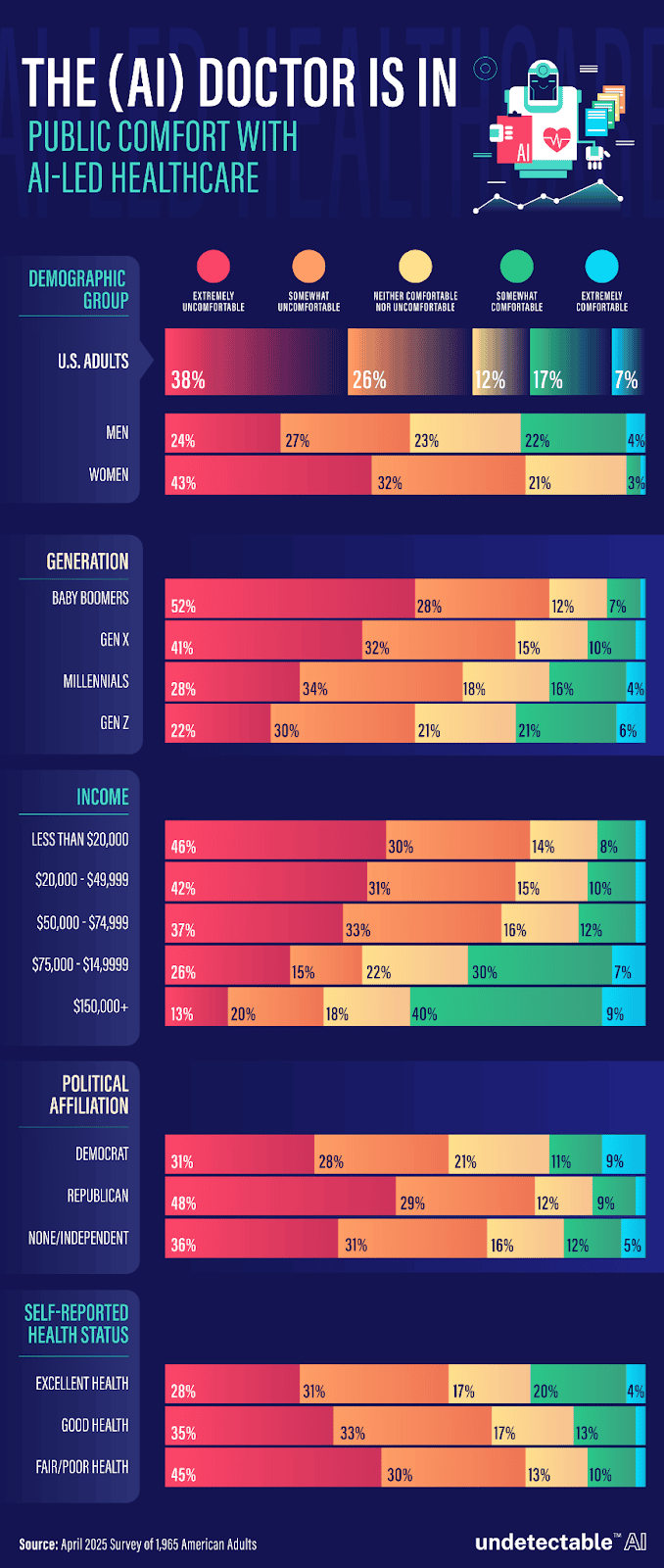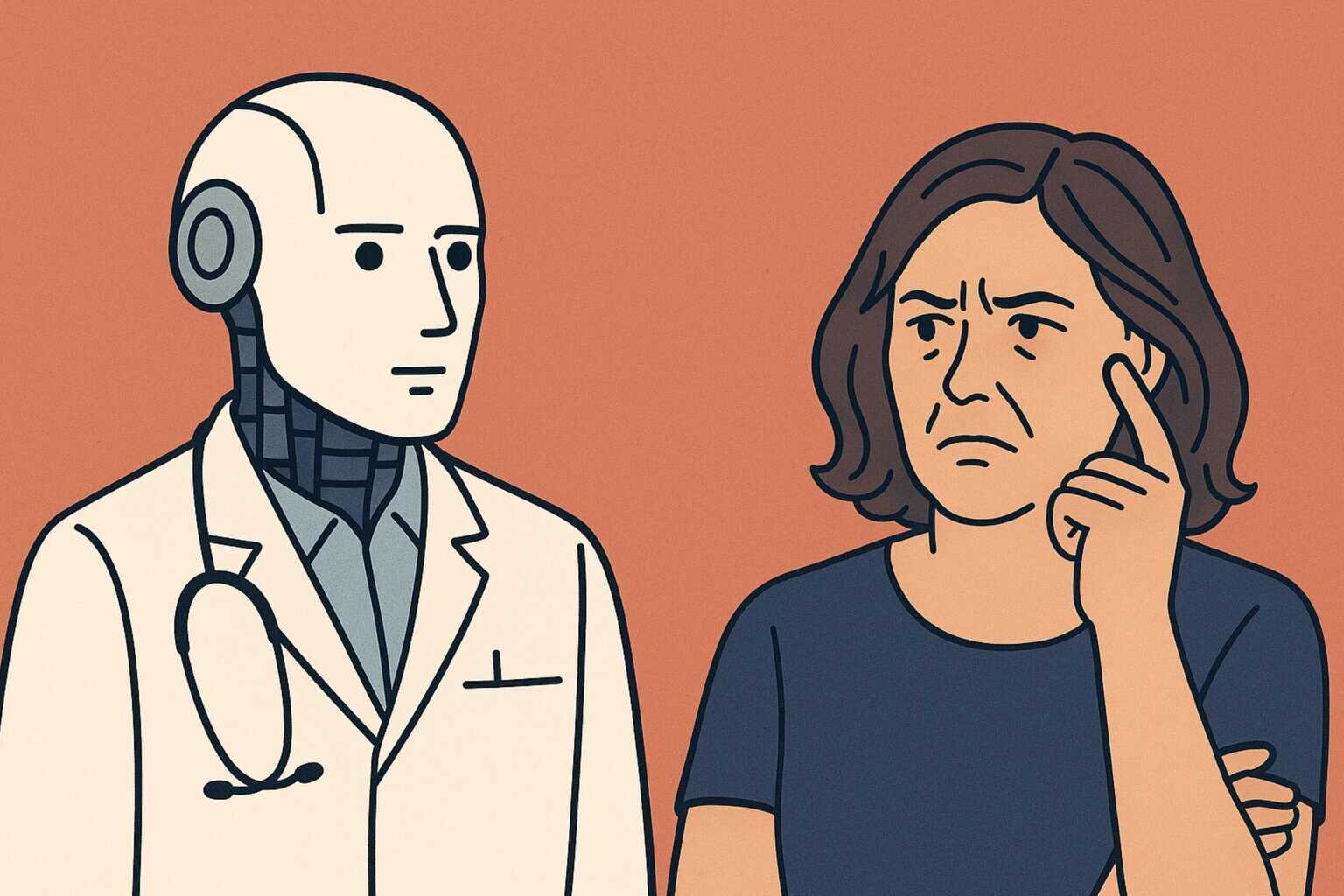As artificial intelligence revolutionizes nearly every aspect of daily life, there’s one frontier where Americans have drawn a clear line: their healthcare. Despite the relatively quick widespread adoption of AI for tasks such as writing, studying, and searching the internet, new survey data from Undetectable AI reveals that when it comes to their health, most adults would rather stick with the human touch, which, for now, can only come from a human doctor.
Key Takeaways:
- A staggering 92% worry about privacy and data security in AI healthcare
- Women show dramatically higher distrust than men, with 75% expressing discomfort compared to 51% of men
- Income creates a trust divide: 49% of high-income earners ($150,000+) are comfortable with AI in healthcare, while only 10% of those earning under $20,000 share that comfort
- Baby Boomers lead the resistance with 80% expressing discomfort, while younger generations show more openness
- Self-identified Republicans (77% uncomfortable) show more resistance than their Democrat counterparts (59% uncomfortable)
America Says “No Thanks” to Robot Doctors
When asked about their comfort level with AI-led healthcare, a resounding verdict was delivered: 64% expressed discomfort with the idea, with 38% reporting they were “extremely uncomfortable” at the prospect. Only a small minority of brave souls (7%) claimed to be “extremely comfortable” with surrendering their medical care to algorithms.
But Americans aren’t just concerned about cold, hard data, the public is worried about losing the sympathetic touch of human-led care. Even as we ask Claude to write our homework or ChatGPT to spit out lines of code, the thought of an AI determining whether that mole is cancerous has most reaching for the phone to schedule an appointment with Dr. Human.

The Great AI Divide: Demographics Tell the Story
Surprise! Not everyone views AI’s role in healthcare through the same lens. From gender to generation to income level, clear patterns emerge in who’s willing to put their faith in algorithmic medicine, and who’s pulling the rip cord.


Never Worry About AI Detecting Your Texts Again. Undetectable AI Can Help You:
- Make your AI assisted writing appear human-like.
- Bypass all major AI detection tools with just one click.
- Use AI safely and confidently in school and work.
The Gender Gap: Women Just Aren’t Having It
Universally, women express far more skepticism than men when it comes to AI’s role in healthcare. A full 75% of women reported feeling uncomfortable with AI-led healthcare, compared to 51% of men. Only 4% of men and a minuscule 1% of women claimed to be “extremely comfortable” with the idea.
Women’s experiences in healthcare, where concerns about being taken seriously by human doctors already exist, could be a driving factor for this skepticism. Adding an AI to the mix doesn’t inspire confidence that the “it’s probably just stress” diagnosis will improve.
OK Boomer, AI Isn’t Your Doctor
Age emerged as another strong predictor of comfort with AI healthcare, as Baby Boomers led the resistance with 80% expressing discomfort, followed by Gen X at 73%, Millennials at 62%, and Gen Z showing the most openness with “only” 52% uncomfortable.
The generational trend runs exactly as one might expect; the younger the patient, the more receptive to AI doctors. Still, it’s worth noting that even among the Gen Z, only 27% reported feeling comfortable with AI healthcare, indicating that youth doesn’t automatically translate to enthusiasm for algorithmic diagnoses.
The Income Effect
The largest fissure appears along income lines. Only 10% of those earning less than $20,000 annually felt comfortable with AI healthcare, compared to a significantly higher 49% of those earning over $150,000.
This disparity may be explained by several realities: higher-income earners typically have better access to healthcare overall, more exposure to new technologies, and potentially more confidence that they could access human medical intervention if an AI-driven approach went sideways. Coupled with the fact that high earners are generally healthier overall, the concern that an AI physician could make a life-threatening mistake is lessened among those with more financial security.
Red vs. Blue on AI Too
The numbers also revealed a significant political divide, with Republicans expressing greater skepticism (77% uncomfortable) than Democrats (59% uncomfortable). Unsurprisingly, those identifying as independent or unaffiliated politically fell between the two major parties, with 67% expressing discomfort with AI healthcare.
Health Status: When the Stakes Get Real
One particularly telling finding relates to self-reported health status. People in fair or poor health expressed the highest levels of discomfort (75%), compared to those in good health (68%) and excellent health (59%).
Clearly, those with the most immediate and serious healthcare needs are also the most reluctant to entrust those needs to artificial intelligence. To those with already compromised health, the thought of adding technological uncertainty to the mix is likely a non-starter.
The Perfect AI Healthcare Patient
If we were to construct a profile of Americans most receptive to AI healthcare based on this data, they would be: young Gen Z men earning over $150,000 annually, identifying as Democrats, and enjoying excellent health. Conversely, the profile of someone most resistant is an older woman with low income, identifying as a Republican, and dealing with health challenges.
What’s Driving the Concern?
If there’s one thing most can agree on, it’s their concern about privacy and data security in AI healthcare. An overwhelming 92% of respondents cite this as their top worry, suggesting that any successful implementation of AI in healthcare will need to prioritize robust data protection measures. The top reasons for concern cited are:
- Privacy and Data Security Concerns 92%
- Lack of Human Touch and Empathy 88%
- Reliability and Safety Concerns 85%
- Lack of Transparency in Decision-Making 75%
- Unclear Responsibility and Liability 67%
- Informed Consent Issues 66%
- Loss of Physician Autonomy 59%
- Algorithmic Bias and Healthcare Disparities 53%
- Limited Access in Low-Income Areas 33%
The Future is Human + AI, Not Human vs. AI
Despite current skepticism, experts suggest the future of healthcare likely lies in a hybrid approach, where AI augments rather than replaces human medical professionals. The Mayo Clinic explains AI isn’t intended to replace humans, but rather to assist. This could help address many current concerns while maintaining the human touch that patients clearly value.
Consider how professional photographers use advanced equipment. While the equipment can autofocus, adjust exposure, and detect faces, it takes human artistry and judgment to capture truly meaningful moments. Healthcare follows a similar pattern: AI can process medical data with incredible speed and precision, but human doctors provide the essential insight, interpretation, and patient connection.
With growing patient loads and a shrinking medical workforce, AI’s role in healthcare isn’t a matter of if, but when. The path forward requires carefully balancing innovation with the irreplaceable human interaction, so that as we embrace AI’s capabilities, we don’t lose sight of what makes healthcare human.
